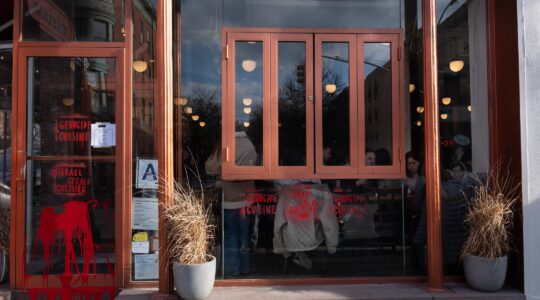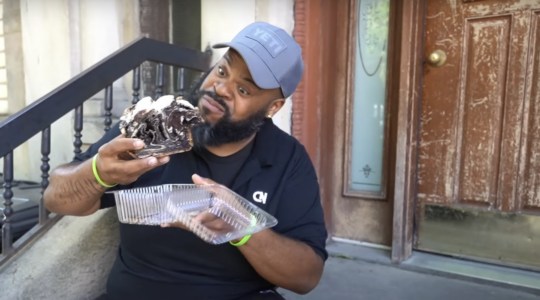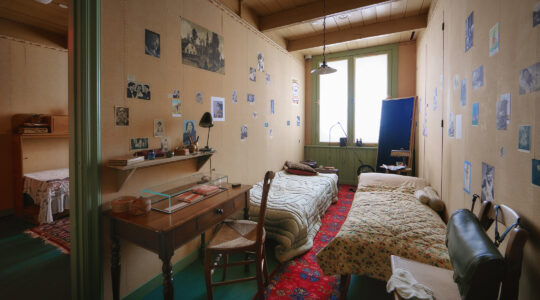It is only three days since I, like so many others, learned of the tragic death of our beloved leader and teacher, Rabbi Aaron Panken. Just hours ago, he was laid to his eternal rest and I cannot sleep. It is the middle of the night and the pain of his sudden departure is overwhelming. Words alone are inadequate.
As a professor for decades and later as president of Hebrew Union College for more than a dozen years, my soul was bound up with his, and I see Aaron in so many ways. I recall our discussion in 1994 when he still served as a rabbi at Congregation Rodeph Sholom about whether he should earn his doctorate in Talmud at Penn or NYU, and I remember animated evening discussions full of humor and passion with him and his friends at the Wexner Graduate Fellowship retreats. Already dean of the New York campus of HUC-JIR (Hebrew Union College-Jewish Institute of Religion) in the 1990s, he counseled and advised me when I was deciding whether to seek the post of president of the HUC-JIR. Later, he served as vice-president of college-institute during my own administration and I depended upon his insights and wisdom throughout my term in office.
I also see him with his son Eli on a visit we took together to Northwestern University, and I rejoice in recalling how he held my granddaughter Lily so tenderly in Los Angeles during her first year of life. I recall as well with gratitude the moment that he ordained my son Micah as rabbi in 2014. However, most of all, I remember standing with Aaron on Shabbat morning in December of 2013 at the convention of the Union for Reform Judaism where he received my blessing before the thousands in attendance as he stood prepared to assume the leadership of HUC-JIR. We both had tears in our eyes as Aaron, with characteristic humility, accepted my charge to lead our beit midrash into the new century. He understood fully that no Jewish community could ever succeed without a great center of learning, and he was determined that HUC-JIR would be such a center for our people.
As I stepped down as president from HUC-JIR, I knew it was in hands more capable than my own.
As a student, Aaron was yachid b’doro, singular in his generation. He was unique in his knowledge and commitment to Jewish texts, and as a young adult he mastered Talmud under the tutelage of his teachers Michael Chernick at HUC-JIR and Larry Schiffman at NYU. His leadership, skills, vision, judgment and ability to inspire and move others to action came naturally to him. He was kind and patient, yet principled and determined. As I stepped down from the college, I knew it was in hands more capable than my own, and he surely fulfilled the aspiration of every teacher who hopes his or her students will exceed them.
As Aaron never left a meeting or event without a citation or story from the Talmud, I would be remiss if I neglected a text in paying tribute to him now. At the end of Chapter 5 of Shekalim in the Jerusalem Talmud (J.T.) that Aaron loved so much, it is told that once Rabbi Hama ben Hanina and Rabbi Hoshaia, his teacher, were strolling before a magnificent synagogue in Lod. Rabbi Hama ben Hanina said to Rabbi Hoshaia, “How much money my ancestors invested here!” Rabbi Hoshaia then said to him, “How many souls did your ancestors invest in here? Did they not have children who labored in Torah?!”
This story captures the vision our teacher, Rabbi Panken, had for the mission of HUC-JIR. It was one of Torah and its relation to life that emerged naturally from the values he so cherished and the students he nurtured and guided. In his senior sermon at HUC-JIR in 1990, Aaron stated, “As we serve in the community, let us remember to look up from the text in front of us. Not, God forbid, to leave the text, but to bring it more forcefully, directly, and personally to the world it addresses. May our journey, from text to world, and back to text again, be blessed.” The journey of Aaron Panken was surely blessed. However, because his was a Torah of kindness and depth that looked up to see the world, he blessed his precious family, the Jewish community, and the larger world as well.
“One does not erect monuments for the righteous,” we read in J.T. Shekalim 5:2. “Their words and deeds constitute their memorial.” My heart rejoiced over these past four years as I witnessed Aaron’s words and deeds, his successes as president. He, with his beloved wife Lisa as his partner, had so many dreams they were about to realize and, to paraphrase the words of Bialik, “this man, who had so many songs left to sing, has now died before his time.” I am confident that these dreams will yet be realized through the foundations he constructed and the visions he has bequeathed us. These dreams and visions will constitute his unforgettable “monument.”
However, for the moment, the raw sadness of his tragic departure prevails. As our Tradition teaches, “Haval al d’avdin v’la mishtakhin – “Alas, for those who are gone, and are no longer to be found” (B.T. Sanhedrin 111a). It will take time to recover and move ahead. Our rabbi has died and a tear will remain forever. But so will his love and his Torah. We give thanks even at this moment of anguish for the privilege we had to know him. Even as we grieve his loss, we will not abandon his enduring legacy.
David Ellenson is chancellor emeritus of Hebrew Union College-Jewish Institute of Religion.
The New York Jewish Week brings you the stories behind the headlines, keeping you connected to Jewish life in New York. Help sustain the reporting you trust by donating today.




